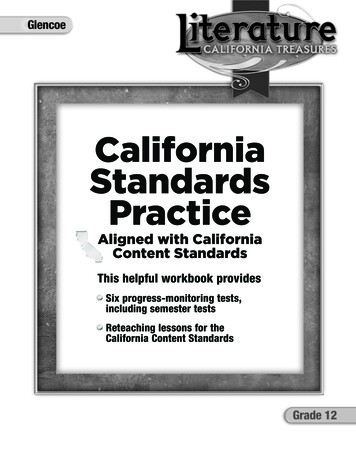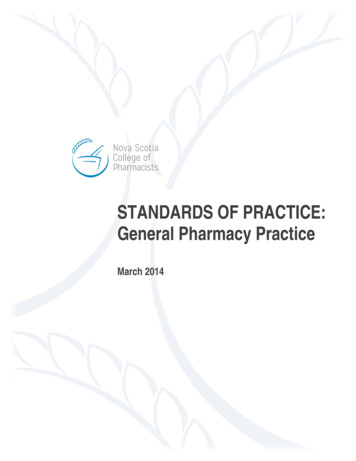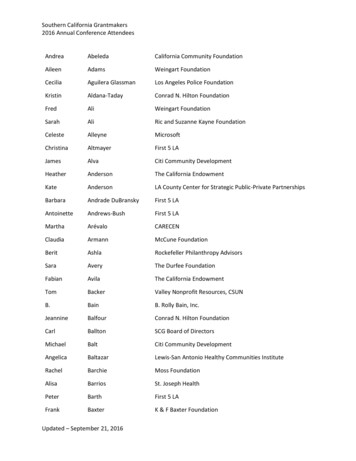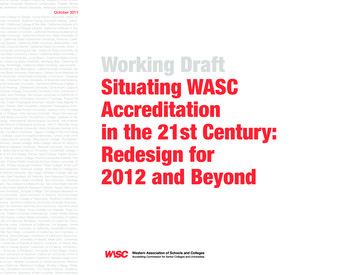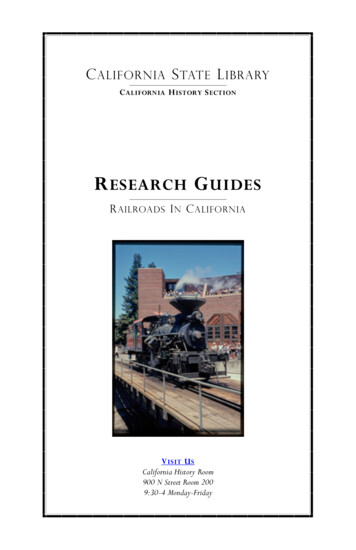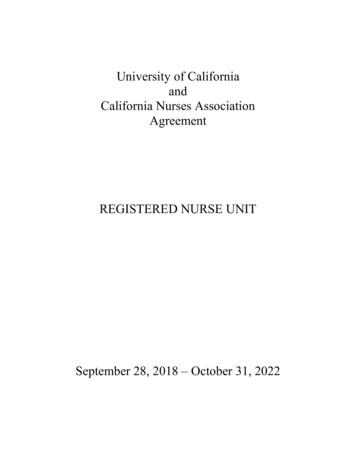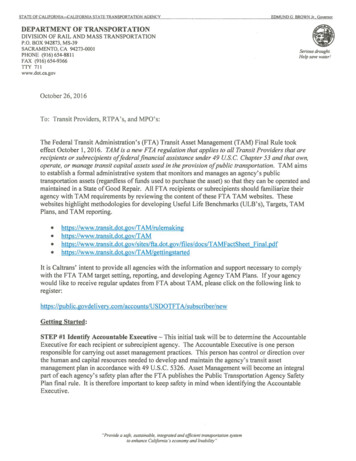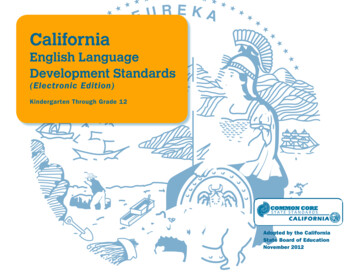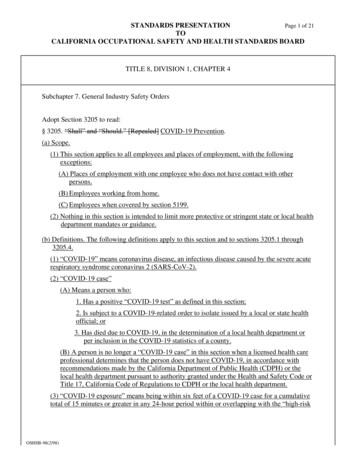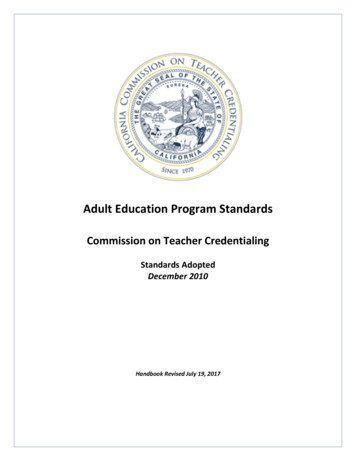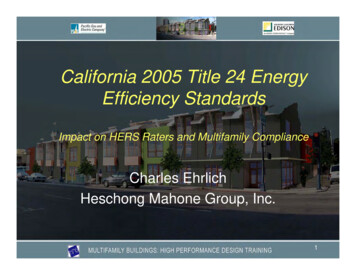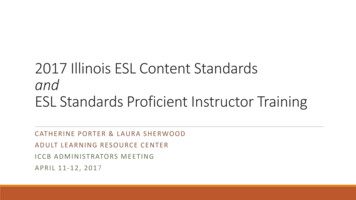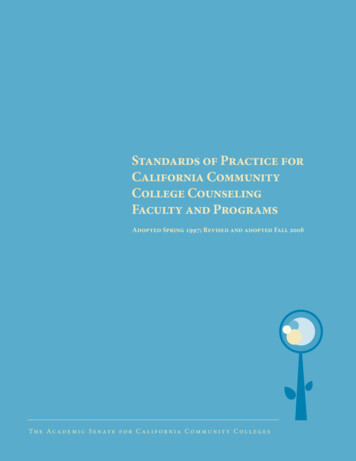
Transcription
Standards of Practice forCalifornia CommunityCollege CounselingFaculty and ProgramsAdopted Spring 1997; Revised and adopted Fall 2008T h e A c a d e m i c S e n at e f o r C a l i f o r n i a C o m m u n i t y C o l l e g e s
Standards of Practice forCalifornia CommunityCollege CounselingFaculty and ProgramsAdopted Spring 1997; Revised and adopted Fall 2008Counseling and Library Faculty Issues Committee 2006-2007Greg Granderson, Chair, Santa Rosa Junior CollegeJoseph Friedman, Library Science, Santa Rosa Junior CollegeLaura Mathis, Counseling, San Diego Mesa CollegeAudrey Moore, Counseling, Antelope Valley CollegeCheryl Stewart, Library Science, Coastline CollegeChris Sugiyama, Counseling, Cerritos CollegeCounseling and Library Faculty Issues Committee 2007-2008Michelle L. Pilati, Chair, Rio Hondo CollegeKevin Bontenbal, Library Science, Cuesta CollegeStephanie Dumont, Counseling, Golden West CollegeMaria Elena Gressel, Counseling, Evergreen Valley CollegeAngel Lujan, Counseling, Mount San Antonio CollegeChar Perlas, Counseling, Mission CollegeChris Sugiyama, Counseling, Cerritos CollegeSpecial thanks to Sylvia Bello-Gardner, Gloria Montenegro Bridges,Timothy Kyllingstad, and Belen Torres-Gil for their contribution to this document.Th e A c a d e m i c S e n at e f o r C a l i f o r n i a C o m m u n i t y C o l l e g e s
Table of ContentsIntroduction. . . . . . . . . . . . . . . . . . . . . . . . . . . . . . . . . . . . . . . . . . . . . . . . . . . . . . . . . . . . . . 1Core Functions. . . . . . . . . . . . . . . . . . . . . . . . . . . . . . . . . . . . . . . . . . . . . . . . . . . . . . . . . . . . 3Academic Counseling. . . . . . . . . . . . . . . . . . . . . . . . . . . . . . . . . . . . . . . . . . . . . . . . . . 4Career Counseling. . . . . . . . . . . . . . . . . . . . . . . . . . . . . . . . . . . . . . . . . . . . . . . . . . . . 6Personal Counseling. . . . . . . . . . . . . . . . . . . . . . . . . . . . . . . . . . . . . . . . . . . . . . . . . . 6Crisis Intervention . . . . . . . . . . . . . . . . . . . . . . . . . . . . . . . . . . . . . . . . . . . . . . . . . . . 7Outreach. . . . . . . . . . . . . . . . . . . . . . . . . . . . . . . . . . . . . . . . . . . . . . . . . . . . . . . . . . . . . . . 7Participation and Advocacy. . . . . . . . . . . . . . . . . . . . . . . . . . . . . . . . . . . . . . . . . . . 8Program Review and Research. . . . . . . . . . . . . . . . . . . . . . . . . . . . . . . . . . . . . . . . 8Training and Professional Development. . . . . . . . . . . . . . . . . . . . . . . . . . . . . . 9Ethical Standards . . . . . . . . . . . . . . . . . . . . . . . . . . . . . . . . . . . . . . . . . . . . . . . . . . . . . . . 11The Counseling Relationship. . . . . . . . . . . . . . . . . . . . . . . . . . . . . . . . . . . . . . . . . 11Confidentiality, Privileged Communication, and Privacy. . . . . . . . . . . . 12Professional Responsibility. . . . . . . . . . . . . . . . . . . . . . . . . . . . . . . . . . . . . . . . . . 12Relationship With Other Professionals . . . . . . . . . . . . . . . . . . . . . . . . . . . . . 12Evaluation, Assessment, and Interpretation. . . . . . . . . . . . . . . . . . . . . . . . . . 13Supervision, Training, and Teaching . . . . . . . . . . . . . . . . . . . . . . . . . . . . . . . . . 13Research and Publication. . . . . . . . . . . . . . . . . . . . . . . . . . . . . . . . . . . . . . . . . . . . 13Resolving Ethical Issues . . . . . . . . . . . . . . . . . . . . . . . . . . . . . . . . . . . . . . . . . . . . . 13Organization and Administration . . . . . . . . . . . . . . . . . . . . . . . . . . . . . . . . . . . . . . . 14Human Resources. . . . . . . . . . . . . . . . . . . . . . . . . . . . . . . . . . . . . . . . . . . . . . . . . . . . . . . . . 15Physical Facilities . . . . . . . . . . . . . . . . . . . . . . . . . . . . . . . . . . . . . . . . . . . . . . . . . . . . . . . 16New Technologies . . . . . . . . . . . . . . . . . . . . . . . . . . . . . . . . . . . . . . . . . . . . . . . . . . . . . . . 17Review of Standards . . . . . . . . . . . . . . . . . . . . . . . . . . . . . . . . . . . . . . . . . . . . . . . . . . . . . 19References. . . . . . . . . . . . . . . . . . . . . . . . . . . . . . . . . . . . . . . . . . . . . . . . . . . . . . . . . . . . . . . 20Appendix: American Counseling Association Code of Ethics . . . . . . . . . . . . . 23
Standards of Practice for California Community College Counseling Faculty and Programs 1IntroductionC o u n s e l i n g p r o g r a m s i n t h e C a l i f o r n i a c o m m u n i t y colleges play a key role in helpingstudents succeed. Over the years, the functions counseling departments perform have increasedsignificantly, further exacerbating the ever-present pressure to serve more students in cost-effectiveways. As a result of the expansion of services absent the resources to ensure the provision of suchservices, the question has arisen as to what roles counseling faculty should play in the delivery ofservices to students. To clarify these roles, the Academic Senate for California Community Colleges(Academic Senate) developed a policy paper, The Role of Counseling Faculty in the CaliforniaCommunity Colleges, which was adopted at its Spring 1995 Plenary Session. This paper providesuseful background on counseling in the California community colleges. The reader is also referred toa paper adopted by the Academic Senate in 2003, Consultation Council Task Force on Counseling,which provides further discussion of the role of counseling faculty, the importance of counselingfaculty in facilitating student success, and information on perceptions of the state of counseling inour system.While The Role of Counseling Faculty in the California Community Colleges described therange of activities of counseling faculty, it did not set out standards for how those roles were tobe performed. Specific standards for some elements of counseling services have appeared inregulation, accreditation guidelines, and ethics statements; but nowhere had these standards beencollected, reviewed, and presented systematically to the community college counseling field untilthe first version of this paper, Standards of Practice for California Community College Counseling,was developed and adopted by the Academic Senate in 1997. The original paper and this revisionoutline effective practices, by addressing the issue of standards of practice and service for Californiacommunity college counseling faculty and programs. This revision serves as an update, reflectingchanges that have transpired in the student services area and incorporating philosophical changesin approaches to counseling. The document has also been renamed to recognize that counselingfaculty and counseling programs are separate entities; there are services that a counseling programmay provide but that may not be specifically a function of counseling faculty.
2 Standards of Practice for California Community College Counseling Faculty and ProgramsThis paper was developed by the Counseling and Library Faculty Issues Committee of the AcademicSenate, with assistance from others in the field. The Academic Senate is dedicated to fosteringthe effective participation of all faculty in academic and professional matters and is directed in itsactivities by resolutions proposed by community college faculty throughout the state and consideredfor adoption by representatives of the various colleges. This paper, and the one that precedes it,were developed to address needs recognized by means of the Academic Senate for the CaliforniaCommunity College’s resolution process. Faculty seeking to effect change are encouraged to usetheir local senate, as well as the Academic Senate, to facilitate improvements in how we serve ourstudents.This paper asserts that there should be a set of universal standards of practice for all communitycollege counseling programs, regardless of institutional or departmental size or fiscal constraints.Complying with these standards requires both adequate staffing and support. These standards areset out in six areas:A. Core Functions,B. Ethical Standards,C. Organization and Administration,D. Human Resources,E. Physical Facilities, andF. New Technologies.These standards have been developed by counseling and other faculty through review of currentpractice, policy, and legislation; study of national standards for the counseling discipline; andprojection of needs for future practice. They are designed to be specific enough to be meaningful,yet general enough to allow flexibility in meeting local needs and constraints. They are intended tobe used in the design, development, and review of counseling department policies and practices.
Standards of Practice for California Community College Counseling Faculty and Programs 3A. Core FunctionsT o a cc o m p l i s h t h e i r m i s s i o n i n p r o v i d i n g essential support to community college students,counseling programs perform a set of core functions through individual and group interactions, aswell as classroom instruction. While differences in student populations and institutional prioritiesmay affect the resources dedicated to these functions within individual counseling programs,nevertheless, these functions are so fundamental to the mission of community college counselingthat every program, whether general, categorical, or aimed at specific populations, should performthem. These functions are derived from Title 5 Regulations and from materials from the AmericanCounseling Association.1) Academic counseling, in which the student is assisted in assessing, planning, and implementinghis or her immediate and long-range academic goals.2) Career counseling, in which the student is assisted in assessing his or her aptitudes, abilities,and interests, and advised concerning current and future employment trends.3) Personal counseling, in which the student is assisted with personal, family or other socialconcerns, when that assistance is related to the student’s education.4) Crisis intervention, either directly or through cooperative arrangements with other resources oncampus or in the community.5) Conducting outreach to students and the community to encourage them to avail themselvesof services, focused on maximizing all students’ potential to benefit from the academicexperience.6) Participating in the college governance process and advocating to make the environment asbeneficial to the intellectual, emotional, and physical development of students as possible.7) Researching and reviewing counseling programs and services with the goal of improving theireffectiveness.8) Training and professional development for counseling staff, interns, and others in the collegecommunity.A detailed review of each function and its related standards follows this introduction. Althoughthe first three core functions—academic, career, and personal counseling—are described belowas separate and distinct functions, in practice they are often inextricably related. The structureof community college counseling programs should be based on the recognition of the student asa whole and complex human being with concerns and issues that are not completely distinct orseparate; academic issues intertwine with career issues, and with personal life-coping issues.An overarching principle that underlies all counseling activities is an appreciation of and respectfor the diversity of the student population. All students must be counseled with a respect for their
4 Standards of Practice for California Community College Counseling Faculty and Programsorigins and cultural values. Counseling faculty need to be aware of how their own unique culturalbackgrounds and experiences may influence their attitudes, values, and biases about students’psychological processes.Counseling faculty need to develop knowledge about how oppression, discrimination, andstereotyping affect them personally and influence their work; and how such attitudes and behaviorsmight impinge upon the lives of their students. Counseling faculty should actively seek out educationaland life experiences that enrich their cross-cultural knowledge, understanding, and skills in order toprovide more culturally sensitive and effective counseling.Counseling faculty should acquire specific knowledge about the characteristics of the studentpopulations with which they work, as well as in the community as a whole. They should develop anunderstanding of how race, culture, ethnicity, gender, sexual orientation, age, physical or mentaldisability, religion, marital status, socioeconomic status and the like affect personality formation,career choices, learning styles, help-seeking behavior, and the appropriateness of counselingapproaches. An understanding of the impact of unique life experiences, such as serving in the armedservices or having been incarcerated, should also guide counseling faculty in their interactions withstudents.In any given counseling session, counseling faculty use their understanding of human and studentdevelopment, as well as counseling theories, to provide the combination of services that addresseach student’s particular needs in an integrated fashion. In recognition of the complexity of studentneeds and life circumstances, counseling services should be delivered in a variety of ways, includingonline and face-to-face individual and group counseling, workshops, and college courses.Academic Counseling1) Academic counseling services include assessment using multiple measures and diagnosis ofstudents’ academic abilities, disabilities, strengths and weaknesses; help in clarifying academicgoals and selecting a program of study; educational planning for transfer, associate degree, andcertificate programs; assisting with clarifying choices and actions, as well as decision-making,planning, and transitioning; making referrals to other support services when a need is indicated;intervening when students’ academic performance is at risk; and providing follow-up (e.g.,academic mentoring, early alert processes, and probation counseling).2) Counseling faculty must ensure that their knowledge of the nature and requirements of thevarious disciplines offered at their college is accurate and current by establishing strong links3) with other faculty, in order to effectively provide educational planning services for transfer,career preparation, degree completion, and certificate programs.4) Counseling faculty assist students in transitioning to college through pre-enrollment advisingduring high school, and through re-entry and community outreach.
Standards of Practice for California Community College Counseling Faculty and Programs 55) Counseling program services should include assisting students in transitioning tobaccalaureate-granting institutions through such services as transfer workshops, universityapplication workshops, university representative visitations, “college day” events, and coursestaught by counseling faculty. These transfer services should be offered through regularcounseling departmental activities as well as by transfer centers. It is important that transfercounseling be an integral part of the counseling program services and not relegated solely tothe transfer center on each college campus. Minimum program standards for transfer centersare established by Title 5 § 51027 and include the provision of academic planning for transfer,supporting and monitoring the progression of transfer students, and the provision of “aresource library of college catalogs, transfer guides, articulation information and agreements,applications to baccalaureate institutions, and related transfer information.”6) Counseling faculty should work closely with articulation officers to ensure that their college’sarticulation reflects the needs of students. Colleges should ensure that faculty articulationofficers are given enough reassigned time to perform their function. Counseling faculty musthave ready access to accurate, up-to-date articulation agreements established between theircollege and neighboring four-year colleges and universities.7) Counseling faculty must stay current on transfer requirements, including admission, generaleducation, and major requirements for the transfer institutions in their region. Counselingfaculty need to regularly participate in transfer conferences and workshops, such as thoseconducted by the University of California, California State University, and the Association ofIndependent Colleges and Universities.8) Counseling programs must work closely with their college’s matriculation program, especiallyin the areas of assessment interpretation, application of multiple measures, orientationprogram development, academic counseling and advising services, follow-up, and prerequisiteand corequisite implementation.9) Counseling faculty assist students through the processes of transcript valuation/interpretation, and general education transfer certification.10) Counseling faculty should develop curriculum and offer courses and workshops that teachthe skills needed for student development and academic success, such as study skills,note taking, and time management. In addition, counseling faculty and faculty in otherdepartments should collaborate to develop discipline-specific academic success courses.11) Counseling faculty should introduce students to Internet resources and software related tocollege services (i.e., registration, grade access), transfer, and career options in order to assistthem in becoming more self-reliant, critical, and independent researchers and learners.
6 Standards of Practice for California Community College Counseling Faculty and ProgramsCareer Counseling1) Counseling faculty teach the career development process and its importance in setting andachieving academic and life goals.2) The career development process should be taught as holistic and lifelong. Counseling faculty teachstudents to examine their lives as a whole—values, interests, aptitudes, and life circumstances.Students need to be made aware that career skills learned now, such as career search anddecision-making methods, may be useful throughout a lifetime.3) Career counseling services should be delivered in a variety of ways, including online and face-toface individual and group counseling, workshops, and college courses.4) Career counseling services include assisting students in clarifying career goals, through intakeinterviews and administration and interpretation of career assessment instruments; instructionin career exploration using the latest technology and methods; and instruction in career goalsetting and decision-making.5) Counseling departments should include a career center that houses up-to-date information oncareer research, labor market, educational programs, and all aspects of the
Chris Sugiyama, Counseling, Cerritos College Counseling and Library Faculty Issues Committee 2007-2008 Michelle L. Pilati, Chair, Rio Hondo College Kevin Bontenbal, Library Science, Cuesta College Stephanie Dumont, Counseling, Golden West College Maria Elena Gressel, Counseling, Evergr
